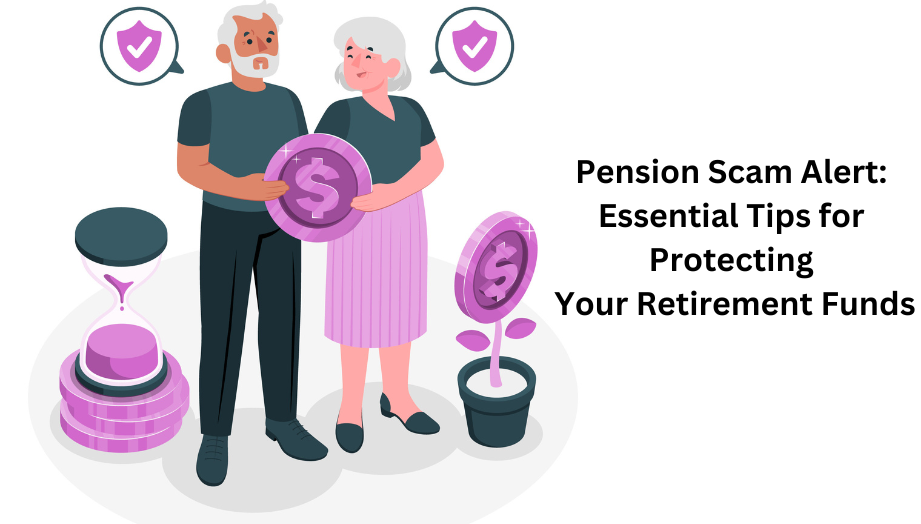Pension Scam Alert: Essential Tips for Protecting Your Retirement Funds

Recently, a dear friend of mine experienced a heartbreaking situation when his father became a victim of a pension scam. He received a call from someone pretending to be a financial advisor, who offered him an “exclusive” investment opportunity that sounded almost too good to be true. Unfortunately, this led to him losing a significant part of his retirement savings. This story highlights the serious dangers of pension fraud, which can put the financial security of retirees and those approaching retirement at risk. With pension scams increasing, it’s more crucial than ever to stay alert. In this article, we’ll delve into what pension scams are, how they operate, and, most importantly, how you can safeguard yourself and your hard-earned savings from these deceitful schemes.
What is a Pension Scam?
A pension scam is a fraudulent scheme designed to trick individuals into transferring their pension savings into fake or risky investments. Scammers often entice victims with promises of high returns, early access to pension funds, or offers of “free pension reviews” that sound too good to be true. These schemes often result in the victim losing part, or even all, of their retirement savings, which may have taken years or even decades, to accumulate.
How Pension Scams Work:
Pension scams typically rely on one of the following strategies:
- Cold-calling individuals out of the blue, offering what they call “free pension reviews” or lucrative investment opportunities.
- Promising “high returns with no risk”, which appeals to people seeking to make their pension last longer or grow quicker.
- Offering early access to pension funds before the legal retirement age, often charging excessive fees in the process.
These types of schemes exploit trust, targeting individuals who are unfamiliar with pension regulations, making them easy victims. Often, scammers create fake companies or pose as financial advisors to gain the victim’s confidence before asking for a pension transfer. Once the transfer is made, the scammers disappear with the money.
Types of Pension Scams
There are several types of pension scams, and they can take on various forms, each designed to target a specific vulnerability. Here are some of the most common tactics used by fraudsters:
- Cold Calls and Unsolicited Offers: Scammers frequently target individuals by phone, email, or text messages, offering “free pension reviews” or exclusive investment opportunities. These unsolicited contacts often promise high returns, claiming that they can help you access better financial opportunities. The aim is to create a sense of urgency, pressuring you into making a quick decision.
Example:
A person nearing retirement receives a cold call offering a “free pension review.” The caller promises to help the individual invest their pension in “high-yield” offshore property, claiming guaranteed returns of 12%. The catch? The scammer encourages the individual to transfer their pension savings before the offer expires. - Fake Investments: One of the most common types of scams involves luring victims into transferring their pension funds into fake or non-existent investment opportunities. These could include bogus schemes like overseas property investments or “green energy” projects. The scammers may create fake brochures or websites that look legitimate to make their schemes seem real.
Example:
An individual is offered an investment in a “green energy” project that promises guaranteed returns within a year. After transferring their pension savings, the individual finds that the project never existed, and their funds are gone. - Pension Liberation Fraud: Some scammers offer what’s called pension liberation fraud, which promises individuals early access to their pension funds—before the legal age of 55. They might charge high fees for this service and manipulate individuals into thinking they can bypass the laws surrounding pension access. However, the victim is usually left with significant tax penalties and possibly a depleted pension pot.
Example:
A scammer contacts someone who is 50 years old and offers to unlock their pension early. The scammer promises they will receive the funds immediately but charges them a hefty fee and leads them into investments that are not regulated. The individual eventually faces tax penalties from HMRC because the transaction wasn’t done properly.
Who Can Be the Target of a Pension Scam?
While anyone with a pension pot (whether private, workplace, or state-managed) can be a potential victim of pension fraud, there are certain groups that are more vulnerable:
- People Nearing Retirement (50-65 years old): Individuals approaching retirement are often looking for ways to make the most out of their pension savings. This makes them attractive targets for scammers who offer “too good to be true” investment opportunities. They may be more inclined to trust promises of better returns or early access to their pension funds.
Example:
A 58-year-old individual nearing retirement receives an offer for a “guaranteed high return” investment and the promise of no risk. The scammer pressures them to act quickly, and the individual transfers their savings, only to later discover that it was all a scam. - Individuals with Large Pension Pots: Scammers are particularly interested in individuals who have accumulated large pension pots. Larger sums offer a bigger payoff for the scammer. Those with significant savings may be targeted by scammers offering exclusive investment opportunities with high returns.
Example:
A person with a pension pot of £250,000 is targeted by scammers claiming to have an exclusive real estate investment opportunity that guarantees returns of 15% annually. The individual transfers a portion of their savings, only to find out that the investment doesn’t exist. - Financially Inexperienced Individuals: Scammers often prey on people who lack knowledge about how pensions work or how investments should be structured. If you don’t know the ins and outs of pensions, you may be more easily misled into thinking the scammer’s offer is legitimate.
Example:
A young professional who has just started contributing to their pension pot may receive a call offering a “highly lucrative” international investment opportunity. Not knowing the specifics, they may believe the offer and transfer their funds, only to find out later that the investment is non-existent. - People in Financial Distress: Scammers prey on those who are struggling financially. They offer “easy” access to pension funds or “quick cash” solutions, which can seem like a way out of debt or financial hardship.
Example:
A person facing financial difficulties due to medical bills is contacted by a scammer who promises them immediate access to pension funds before retirement age, charging high upfront fees. The individual is left with depleted savings and hefty tax penalties. - Older Adults: Older adults, particularly retirees or those nearing retirement, are often more trusting of people who appear to be professional or authoritative. They may also be less familiar with digital technologies and more easily influenced by scammers posing as legitimate advisors.
Example:
An elderly retiree receives a call from a supposed “financial advisor” offering to help them maximise their pension funds. Trusting the call, they transfer their money to what turns out to be a fraudulent investment scheme.
How to Spot a Pension Scam
Identifying a pension scam early is crucial to protecting your savings from fraud. Scammers use a range of tactics to gain your trust and trick you into making costly mistakes. Here are some of the most common red flags to watch out for:
1. Unsolicited Contact
One of the most common tactics used by scammers is to reach out to potential victims via cold calls, unsolicited emails, or text messages. These communications might offer “free pension reviews,” “exclusive opportunities,” or claims of high returns on investments. If you didn’t initiate the contact, it’s a strong indicator that it could be a scam.
Example:
You receive a call or email from a supposed financial expert offering a “free pension review” or “investment opportunity” without ever having contacted them first. Legitimate financial advisors never make unsolicited contact, especially regarding something as important as your pension.
How to Spot It:
- Hang up or ignore unsolicited calls.
- Don’t respond to emails or texts unless they come from trusted sources.
- Check the phone number or email address of the sender to see if it matches any known official or regulated financial body.
2. Promises of Guaranteed High Returns
Another red flag is when an investment opportunity promises high returns with “no risk”. In the world of finance, high returns always come with some level of risk. Any promise of guaranteed returns, especially those far above what is available in the market, is highly suspicious.
Example:
A scammer claims you can earn 10-15% returns annually without any risk. Legitimate investments, even low-risk ones, rarely offer such high returns. Anything that sounds too good to be true usually is.
How to Spot It:
- Compare the offered returns with those available through regulated financial products.
- Be cautious of anyone who promises returns that seem far too high.
- Always remember, “If it sounds too good to be true, it probably is.”
3. Pressure Tactics
Scammers often try to create a sense of urgency. They push you to act quickly, claiming the opportunity is “time-limited” or “exclusive.” Scammers know that when you rush, you’re less likely to think things through clearly.
Example:
A caller tells you that this “exclusive” pension investment is only available for the next 24 hours, and if you don’t act quickly, you’ll miss out on a once-in-a-lifetime opportunity.
How to Spot It:
- Legitimate offers won’t pressure you to make immediate decisions.
- Always take time to research and consult with someone you trust before moving forward.
- If someone is rushing you, it’s a huge red flag.
4. Unregulated Firms or Advisors
Before entrusting your pension to anyone, it’s crucial to check their credentials. Scammers often impersonate legitimate financial advisors or firms that lack the proper registration with regulatory bodies like the Financial Conduct Authority (FCA) in the UK, the Securities and Exchange Commission (SEC) in the US, or similar bodies in other countries.
Example:
You’re offered a “pension review” by an advisor, but when you check the advisor’s credentials, you find they aren’t registered with any financial regulatory body. This is a huge red flag.
How to Spot It:
- Verify the advisor’s credentials through the FCA Register (UK) or SEC website (US).
- Ask for a firm’s registration number and double-check it with the relevant authority.
- Avoid dealing with anyone who cannot provide a valid regulatory number.
5. Requests for Upfront Fees
Another key indicator of a pension scam is the request for upfront fees. Scammers may ask for payment in advance to access your pension, unlock it, or invest it in their “exclusive opportunity.” Legitimate pension providers never charge upfront fees to access your funds.
Example:
A supposed investment firm tells you that you need to pay an upfront fee to unlock your pension or access a special investment scheme. Once the payment is made, you never hear from them again.
How to Spot It:
-
- Never pay upfront fees to access or transfer your pension funds.
- Be wary of anyone asking for a payment before providing services.
-
If they say it’s a “one-time payment” or “administrative fee,” consider it a red flag.
6. Offshore Investments
Pension scams often involve offshore investments, which are typically located in tax havens or foreign markets. Scammers may present these overseas investment schemes as exclusive or “high-yield.” These schemes are often unregulated, making it difficult to recover any lost funds.
Example:
A scammer might promise investment in “foreign property” or “international stocks” that are entirely unregulated and offer massive returns. However, when you transfer your funds, the investments don’t exist or aren’t legitimate.
How to Spot It:
- Be cautious of investments in offshore markets or unregulated foreign investments.
- Check the jurisdiction and regulatory environment for overseas opportunities.
- Ask the firm to explain the investment in detail and check if it’s a regulated and verified opportunity.
How to Protect Yourself from Pension Scams
The best way to protect your pension from fraudsters is through prevention. Here’s how you can safeguard your retirement and investments:
1. Reject Unsolicited Offers
Always be sceptical of unsolicited offers. Don’t engage with cold calls, unexpected emails, or messages about your pension. Scammers often use these tactics to lure you into giving up your personal details.
Tip:
Hang up on unsolicited calls. If you receive an unsolicited message, delete it immediately.
2. Verify Credentials
Before taking any action, always verify the credentials of the advisor or firm. Check if they are registered with the appropriate regulatory authority, such as the FCA in the UK or the SEC in the US. These regulators maintain online registers where you can search for financial advisors and firms to ensure they are legitimate.
Tip:
Use the FCA Register or SEC’s online search tools to confirm that the advisor or firm is regulated and properly registered.
3. Take Your Time
Don’t rush into decisions regarding your pension. A legitimate opportunity will still be available after you’ve had time to think it through and research it. Scammers use pressure tactics to push you into decisions quickly, which can lead to regret later.
Tip:
Take your time, consult with someone you trust, and seek second opinions before making any pension decisions.
4. Seek Independent Advice
Always seek independent advice from a regulated financial advisor. Ensure that the advisor is not tied to any investment scheme or offer you are considering. Independent advice ensures you receive impartial guidance.
Tip:
Look for a certified financial planner or regulated advisor who can provide unbiased advice on your pension options.
5. Research Companies and Offers
Before you engage with a company or investment offer, always research them online. Look for reviews or any information that mentions “scam” or “fraud.” Check online forums or watchdog websites that track and report fraudulent schemes.
Tip:
Search the company name with terms like “complaints,” “reviews,” or “scam” to uncover any negative feedback.
6. Use Trusted Resources
In the UK, services like Pension Wise offer free and impartial advice on pensions. In other countries, look for government-run or not-for-profit services that provide unbiased guidance for retirement planning.
Tip:
Use Pension Wise or similar services to get free guidance before making any pension-related decisions.
What to Do If You Think You’re Being Targeted by a Pension Scam
If you suspect you are being targeted by a pension scam, it’s important to take immediate action. Early intervention can help prevent further damage and potentially recover your funds.
1. Stop Communication
If you suspect that a scam is occurring, immediately stop all communication with the suspicious party. Whether it’s a phone call, email, or text message, do not respond to any further requests for personal information or money. Scammers rely on continued communication to further manipulate victims.
Example:
If you’ve received an unsolicited call from someone claiming to be from your pension provider or a financial adviser, hang up immediately. Similarly, if you received an email offering a “too good to be true” investment opportunity, delete it and avoid replying.
2. Verify the Situation
Contact your pension provider directly using the official contact details. Do not use any phone numbers, websites, or email addresses provided by the suspicious party. Reaching out to your pension provider through legitimate channels will help verify if there have been any unauthorised changes to your account or if the offers you’ve received are genuine.
Example:
If you were contacted by a supposed pension advisor offering “special” investment opportunities, call your pension provider directly using the contact number from your most recent statement or their official website. Ask them to confirm whether any transactions or changes have been made to your pension pot.
3. Report the Scam
If you believe you are being targeted, it’s crucial to report the scam to your country’s financial regulator and local authorities. In the UK, for instance, report to Action Fraud, the UK’s national fraud and cybercrime reporting centre. They will guide you on the next steps and help track down the scammers.
Example:
In the UK, you can file a report with Action Fraud online or by phone. They will give you a reference number, which you can use to track the progress of your case. In the US, you can report scams to the Federal Trade Commission (FTC) or your state’s financial regulatory body.
What to Do If You Think You’re Being Targeted by a Pension Scam
If you suspect you are being targeted by a pension scam, it’s important to take immediate action. Early intervention can help prevent further damage and potentially recover your funds.
- Stop Communication:
If you suspect that a scam is occurring, immediately stop all communication with the suspicious party. Whether it’s a phone call, email, or text message, do not respond to any further requests for personal information or money. Scammers rely on continued communication to further manipulate victims.
Example:
If you’ve received an unsolicited call from someone claiming to be from your pension provider or a financial adviser, hang up immediately. Similarly, if you received an email offering a “too good to be true” investment opportunity, delete it and avoid replying. - Verify the Situation:
Contact your pension provider directly using the official contact details. Do not use any phone numbers, websites, or email addresses provided by the suspicious party. Reaching out to your pension provider through legitimate channels will help verify if there have been any unauthorised changes to your account or if the offers you’ve received are genuine.
Example:
If you were contacted by a supposed pension advisor offering “special” investment opportunities, call your pension provider directly using the contact number from your most recent statement or their official website. Ask them to confirm whether any transactions or changes have been made to your pension pot. - Report the Scam:
If you believe you are being targeted, it’s crucial to report the scam to your country’s financial regulator and local authorities. In the UK, for instance, report to Action Fraud, the UK’s national fraud and cybercrime reporting centre. They will guide you on the next steps and help track down the scammers.
Example:
In the UK, you can file a report with Action Fraud online or by phone. They will give you a reference number, which you can use to track the progress of your case. In the US, you can report scams to the Federal Trade Commission (FTC) or your state’s financial regulatory body.
What to Do If You Were Scammed and Money Was Transferred
If you’ve unfortunately fallen victim to a pension scam and have already transferred funds, act quickly to potentially recover your savings. The sooner you take action, the more likely you are to prevent further losses or reverse the damage.
- Contact Your Pension Provider:
Get in touch with your pension provider immediately and ask if the transfer can be traced or reversed. While this depends on the timing and circumstances, some pension providers may have mechanisms in place to stop or reverse transactions if they occur within a short period.
Example:
If you were tricked into transferring your pension funds to an unregulated overseas investment scheme, call your pension provider and ask if the transaction can be blocked or reversed. If the money has already been moved, they may be able to work with banks or authorities to trace the transaction. - Report the Scam to Authorities:
It’s essential to report the scam to your financial regulator as well as law enforcement. In many countries, regulators such as the Financial Conduct Authority (FCA) in the UK, the Securities and Exchange Commission (SEC) in the US, or similar agencies can investigate fraudulent transactions and take action against unregulated companies. In addition, report the scam to the police or a fraud agency to ensure that it is on record.
Example:
In the UK, you can report the scam to Action Fraud, which will guide you on the next steps and open an investigation. Similarly, in the US, you can contact the FTC or your state’s securities regulator to report fraudulent investment schemes. - Seek Legal Advice:
If the scam involves a substantial amount of money, it’s worth considering legal action. A lawyer who specialises in fraud or financial disputes can assess whether you have grounds to pursue scammers through the courts or whether you can claim compensation through insurance or government schemes. Legal professionals can also guide you on the best course of action to potentially recover your pension savings.
Example:
If the scammers are from an unregulated overseas firm, a solicitor may be able to help you investigate whether the firm’s directors can be held personally liable or if international legal action can be taken to recover your funds.
Managing Emotional Impact During and After a Pension Scam
Pension scams can be emotionally challenging. It is crucial to be aware of how these experiences affect your mental and emotional well-being and to take steps to manage your emotions during and after the attack.
During the Attack:
- Stay Calm:
Scammers rely on panic and urgency to make you act impulsively. Take a deep breath, step back, and assess the situation before making any decisions.
Example:
If you’re being pressured to make a fast decision, pause. Try to separate yourself from the moment and think logically. - Trust Your Instincts:
If something feels off, it probably is. Don’t let convincing words or pressure from the scammer cloud your judgment. Trust your gut.
Example:
If the offer seems too good to be true, it’s likely a scam. Trust your instincts to back away. - Seek Support:
Talk to a trusted friend or family member for advice. They may offer a fresh perspective or notice red flags you might miss due to stress.
Example:
Talk to someone you trust about the situation, whether it’s a spouse, family member, or friend. They may help you see the situation from a different angle.
After Being Attacked:
- Acknowledge Your Emotions:
Feelings of shame, anger, or confusion are natural. Don’t bottle them up. It’s important to express how you feel, either to a trusted person or a counsellor.
Example:
Speaking with a counsellor or support group can help you process the emotional toll the scam has taken. - Avoid Self-Blame:
Scammers are highly skilled at manipulating victims. Being deceived doesn’t diminish your intelligence or value. It’s not your fault.
Example:
Remind yourself that scammers are professionals who use sophisticated tactics to deceive you. It’s not a reflection of your intelligence. - Rebuild Confidence:
Focus on what you can control. Report the scam, assess the situation with a legitimate advisor, and make necessary adjustments to your financial plans.
Example:
By taking action and seeking advice, you can regain control and begin to recover financially. - Connect with Others:
Join support groups for scam victims. Sharing your experience with others who understand can help you feel less isolated and provide valuable coping strategies.
Example:
Online forums or support groups can be a great way to connect with people who have been through similar experiences. - Practice Resilience:
Use the experience as a learning opportunity. Educating yourself and others can transform a negative event into a source of personal strength.
Example:
Use your experience to educate others about pension scams, empowering them to avoid falling victim.
Conclusion:
Pension scams can leave both financial and emotional scars, but with awareness and quick action, it’s possible to minimise the damage and recover. The key is to stay vigilant, trust your instincts, and take the time to research and verify any investment opportunities that come your way. If targeted, don’t hesitate to stop communication, verify the situation with trusted sources, and report the scam immediately. Most importantly, remember that being scammed does not reflect your intelligence or value—scammers are skilled manipulators who prey on unsuspecting individuals.
Managing your emotions throughout this process is crucial for your recovery. Acknowledging your feelings, seeking support, and taking action to regain control of your finances will help you heal and move forward. Whether you’ve been scammed or are currently facing a potential scam, focusing on the steps you can take to protect your future will empower you to learn from the experience and share your knowledge with others, ultimately helping prevent others from falling into the same trap. By doing so, you’ll turn a negative situation into a source of strength, resilience, and wisdom.
Stay informed and protect your retirement—learn more about pension scams and how to safeguard your savings on Finance Markets Today!


 English
English 





































































































